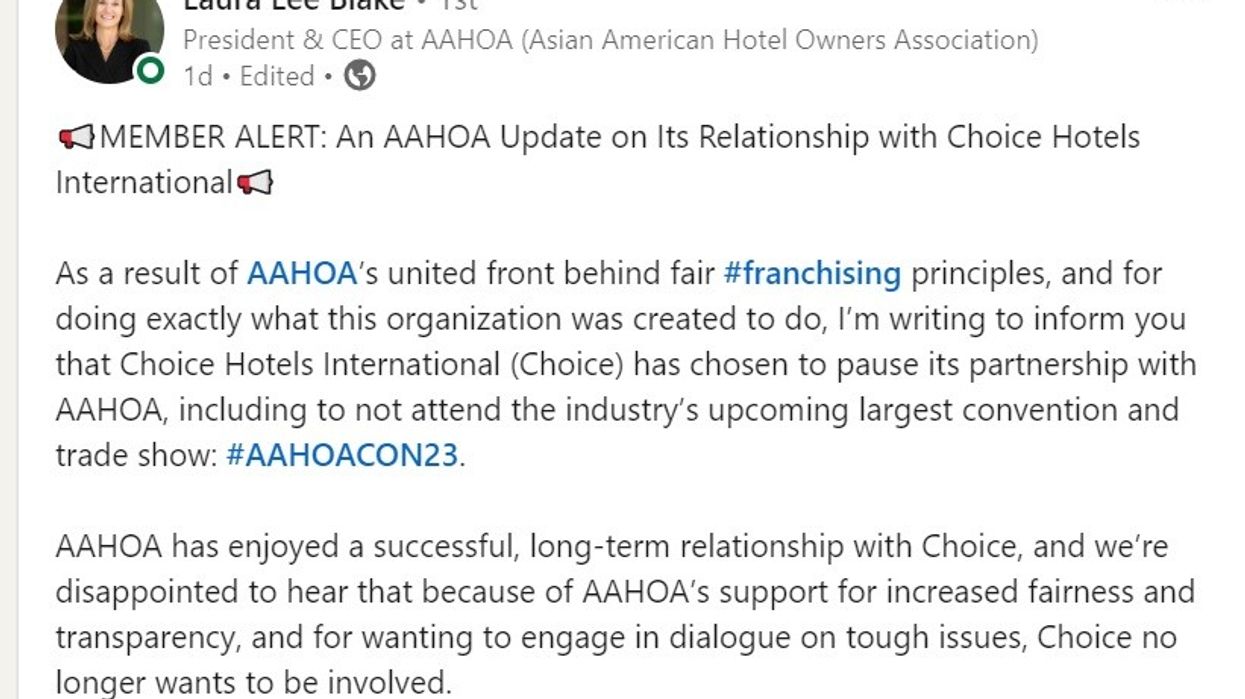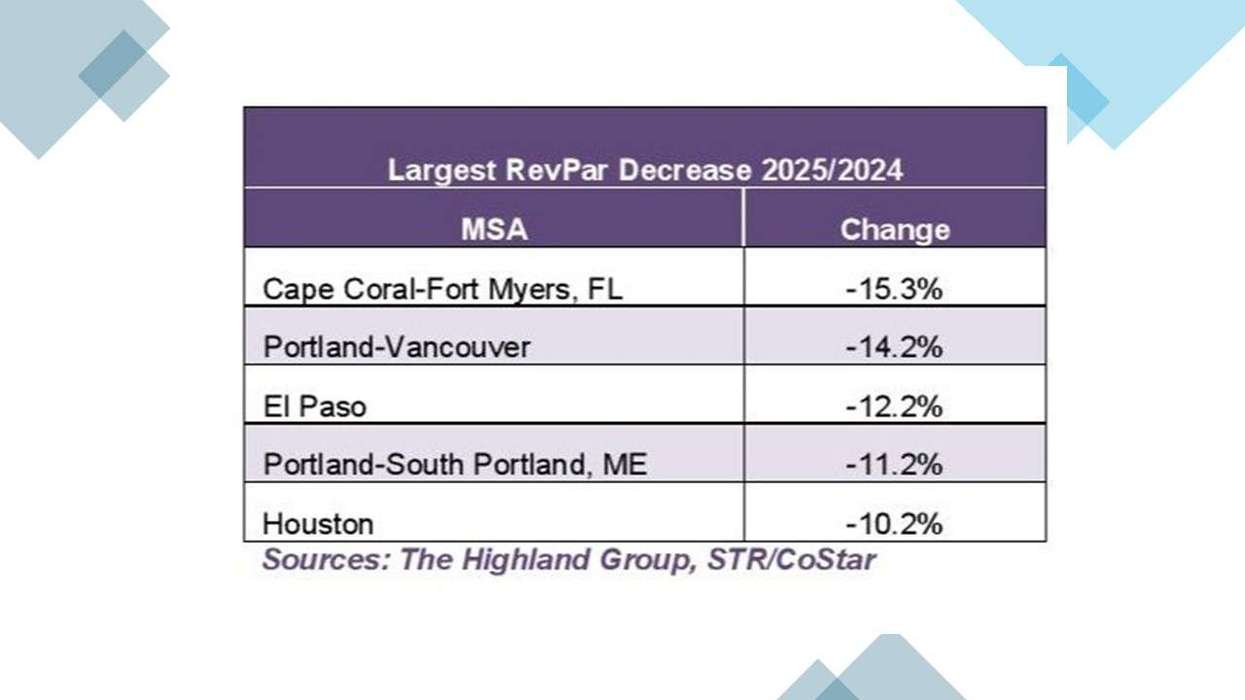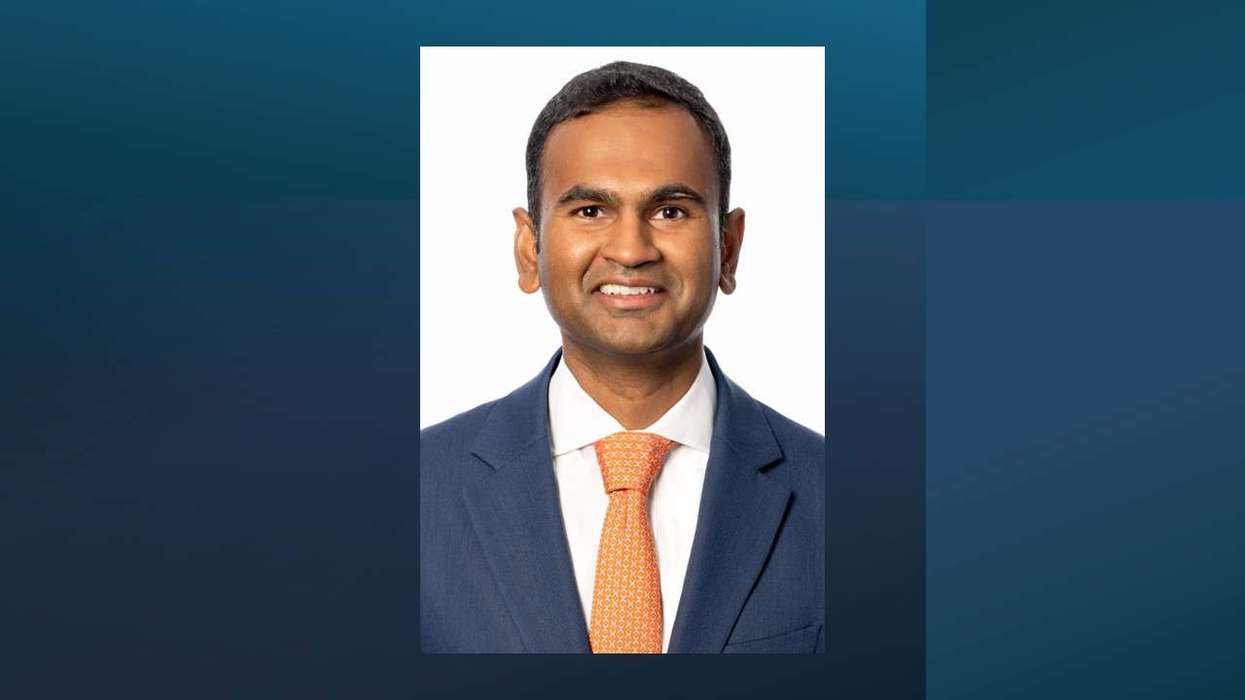CHOICE HOTELS INTERNATIONAL has become the second hotel company to withdraw its support for AAHOA over the association’s 12 Points of Fair Franchising. Specific reasons for the split remain unclear, but AAHOA said it was due to the association’s “united front behind fair franchising principles.”
Like Marriott International in January, Choice has informed AAHOA it will not participate in the upcoming AAHOA Convention & Trade Show, according to a LinkedIn.com post from Laura Lee Blake, AAHOA’s president and CEO, as well as a member alert from Nishant “Neal” Patel, AAHOA chairman.
“As a result of AAHOA’s united front behind fair franchising principles, and for doing exactly what this organization was created to do, I’m writing to inform you that Choice Hotels International has chosen to pause its partnership with AAHOA, including to not attend the industry’s upcoming largest convention and trade show,” said both alerts. “AAHOA has enjoyed a successful, long-term relationship with Choice, and we’re disappointed to hear that because of AAHOA’s support for increased fairness and transparency, and for wanting to engage in dialogue on tough issues, Choice no longer wants to be involved.”
Choice has not yet responded to a request for comment. After Marriott’s withdrawal in January the company issued a statement that appeared to be still supportive of AAHOA.
“Our franchisees are at the center of everything we do,” Choice said at that time. “Choice Hotels is a founding member of AAHOA. We look forward to continuing our dialogue with AAHOA.”
AAHOA’s most recent alert went on to explain that its position on fair franchising is part of its role as “the collective voice of hoteliers.”
“In fact, AAHOA is the largest minority-owned hotel association in the world, with the strongest focus in the industry on promoting women as hoteliers, as demonstrated by our inaugural HerOwnership conference in 2022. While Indian Americans make up roughly 1.4 percent of the U.S. population, AAHOA members own more than 60 percent of all hotels in this country — truly an American dream success story,” the statement said. “To fulfill our vision of being the foremost resource and advocate for America’s hotel owners also means we proudly stand upon principles that represent the best interests of our members, the hotel owners. We push for change that will improve the livelihoods of hospitality entrepreneurs while balancing a mutually beneficial franchisor-franchisee relationship.”
Marriott’s reasons for withdrawal
Marriott also issued a single statement following its decision to pull support for AAHOA.
“We remain committed to owners and franchisees in the Asian American community and believe our relationship with our owners and franchisees is best managed directly, rather than through a third-party organization with whom our objectives no longer align.”
A letter circulated in July gave more detail, though it was not confirmed as coming from Marriott.
“Ultimately, Marriott cannot support, either by endorsement and/or financially, any organization that is in direct opposition to our business model and interests,” said the letter. “We believe quite strongly that the longstanding relationship between Marriott and AAHOA has proven to be mutually beneficial, and we are deeply saddened that AAHOA has chosen to pivot its stance on these key issues in a way that is decidedly anti-franchising and anti-Marriott (especially since, as the AAHOA leadership shared with us in a recent meeting, neither AAHOA’s leaders nor its members have any material issues with Marriott’s approach to franchising or to our franchisees).”
Also, AAHOA members, such as local hotelier and ambassador for the Mid-Atlantic region Rajesh Patel, at table, came before the New Jersey State Assembly last May to support Assembly Bill 1958, which would make changes to the New Jersey Franchise Practices Act that could benefit hotel owners. Marriott listed AAHOA’s support for the legislation among its reasons for separating from the association.
In its negotiations with Marriott, AAHOA said previously it emphasized that it was not the author of New Jersey Assembly Bill A1958, which would make changes to the New Jersey Franchise Practices Act. However, it supports several points of the bill that provide:
- If a franchiser or brand partner receives commissions or rebates from a vendor based on purchases by franchisees, that must be fully disclosed and turned over to the franchisees and the franchise system.
- AAHOA will not object to vendor exclusivity so long as the vendor provides these mandated products and services to Franchisees for competitive pricing.
- AAHOA will not support the selling of loyalty points by a brand partner or franchiser for a profit.
- AAHOA will not support franchise fees being added that were not previously disclosed in the franchise disclosure document without prior approval.
- AAHOA supports the preference of certified women-owned, minority-owned and veteran-owned businesses to serve as the mandated and preferred vendors for the franchise business model.
Other hotel companies, including G6 Hospitality, BWH Hotel Group and Red Roof all have issued statements in support of AAHOA’s 12 Points.
In his statement, Patel said AAHOA’s position is essentially about protecting members’ bottom line and strengthening the franchise business model. He expects the association will continue to do that.
“It’s about standing up to large corporations which, over time, have diminished the equitable role that hotel owners have in operating your businesses, supporting your families, and better contributing to your communities,” Patel said. “While we are deeply disappointed to learn of Choice’s desire to pause its relationship with AAHOA, make no mistake: We will continue to advocate for your interests while maintaining an open-door policy with our franchise partners. Dialogue on complex issues is what progresses us forward.”
Asian Hospitality will continue to update this story as new information becomes available.






